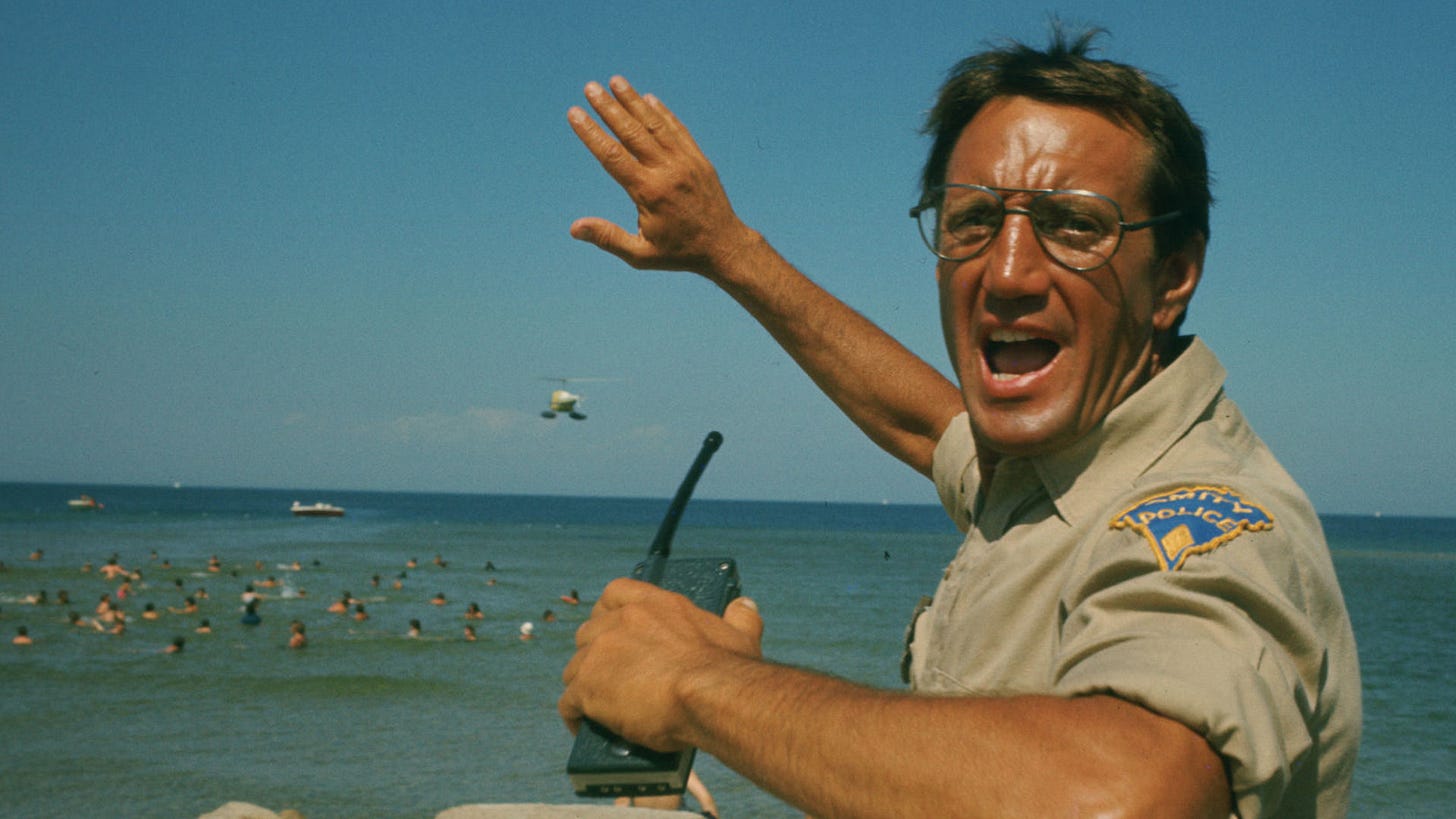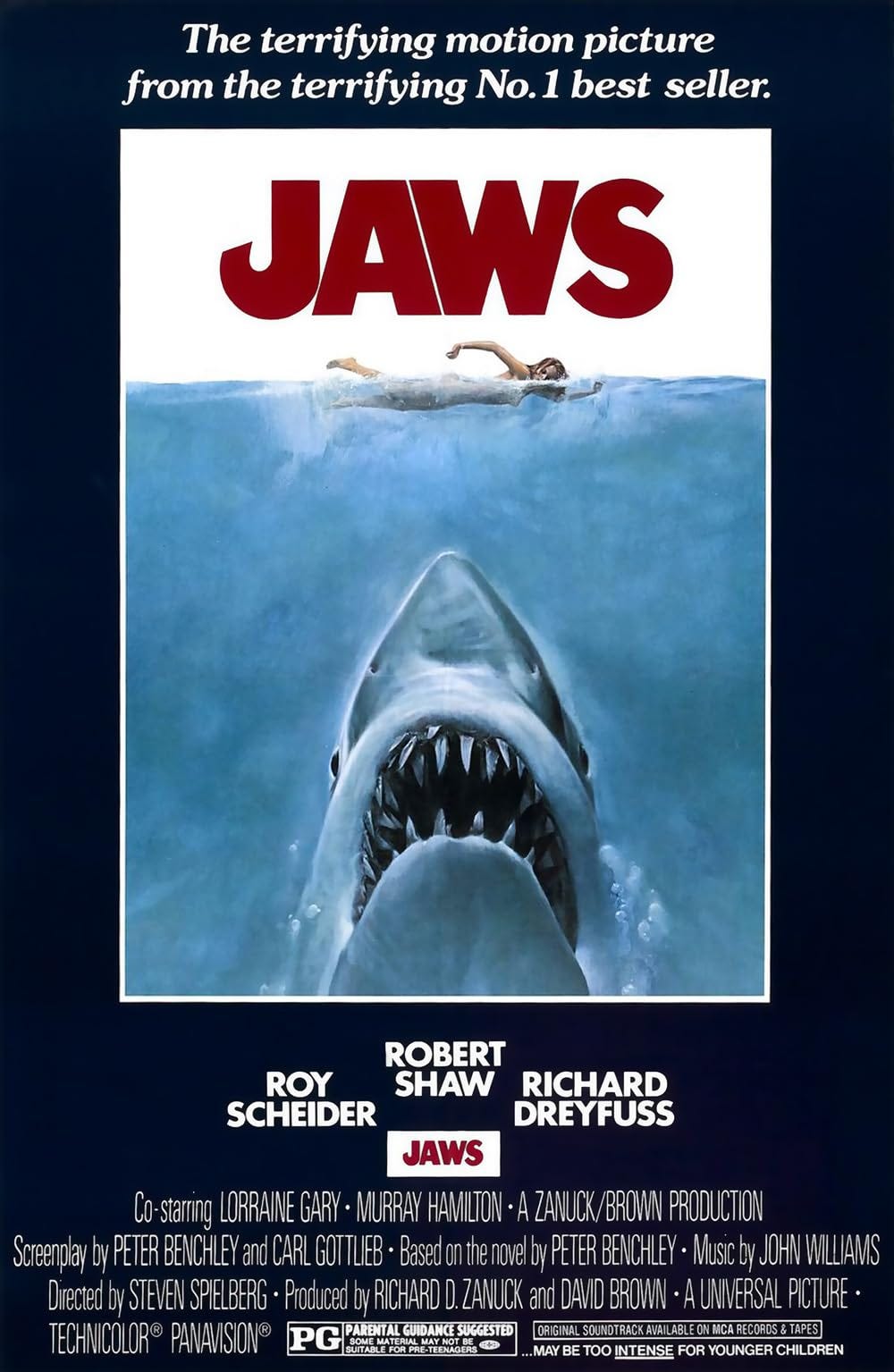It's the 4th of July and I'm Thinking About the Men From Jaws (1975) Again
Today’s issue of Dust On The VCR is a guest post! Unless you’re new here, you’re familiar by now with the electric mind of Mary Catherine McAnnally Scott, our most frequent (and probably most popular?) guess writer.1 You can find plenty of her work at Garden & Gun, and she’s written about Galaxy Quest, George of the Jungle, Indecent Proposal, and Road House for this very newsletter. And now she’s tackling the quintessential 4th of July movie (see what I did there?) the way only she could. Take it away, Mary Catherine!
There isn’t really a way to write anything fresh about Jaws. People have studied it for 50 years and written countless theses about it. I’m sure there are even college courses with pithy titles about “Taking A Bite Out Of Filmmaking!”
This movie is as classic as it gets. And honestly, I may not have anything new to add. But as I sat down for at least my dozenth rewatch, the magic of the 50th anniversary coinciding with the 4th of July was just too damn rich a text to pass up. And I feel pretty certain that this film has something new to say to all of us swimmers in 2025.2
Amity Island, the fictitious New England town where the movie takes place, has seen calm for over 25 years. In fact, that’s why Chief Brody and his family moved there. He felt he couldn’t make a difference in New York. The shark attack is the first incident in decades—and Spielberg uses that crisis to clarify our characters’ identities, the way these sorts of calamities often do.
“Are you an Islander?” Brody asks the boyfriend of the recently chomped girl in the beginning of the film. And later, on the beach, Brody’s fabulous, strapless-swimsuit-clad wife Ellen asks her friend “When do I get to become an Islander?” “You’re not born here,” says her friend. “You’re not an Islander. That’s it.”
Being an Islander doesn’t make someone a good person. It just makes them “in.” The ideas of goodness and belonging are what we watch Brody, our audience-proxy protagonist, wrestle with. He’s not an Islander, but he’s striving to belong. He believes himself to be a good person. But is he?
Let's consider the evidence. For one, Brody is consistently talked out of closing the beaches. After the first attack, he asks his deputy “Where do we keep the ‘Beach Closed’ signs?” “We never had any,” the deputy responds. And after the whole “Amity is a summer town” speech from Mayor Vaughn, Brody opens the beaches—only for little old Alex Kintner and his yellow raft to become the next chomping victim.3
And our chief gets whacked for this breach of integrity. Literally.
“I just found out that a girl got killed out here last week, and you knew it,” a grieving Mrs. Kintner says to Brody after she slaps him across the face.4 “You knew there was a shark out there. You knew it was dangerous. But you let people go swimming anyway. You knew all those things, but still my boy is dead now.”
On the 4th of July weekend, when tourists pour in by the triple-decker-boatful, the first set piece begins with a reporter talking about how there’s a shark-shaped shadow looming over the holiday weekend. Hundreds of tourists line the beaches, but they aren’t swimming. Even so, they’re enjoying themselves, listening to music, spending their money in Amity, but it isn’t enough. Mayor Vaughn approaches a family and puts on a mocking tone of voice: “Why aren’t you in the water?” The older couple trepidatiously takes their three young children into the water.5 Of course, this prompts a cascade of swimmers to hop into the water—only to be a buffet for the next fatal attack.
Here’s what’s chilling about this scene to me: Mayor Vaughn already has everything he could hope for. The tourist season is hot, the crowds have arrived, business is booming, and no one is being gobbled. But it’s not enough. For Mayor Vaughn, the lack of swimming signals that things are less than perfect, and he can’t allow that to happen. Amity has to seem the same as it always has been, a return to an age before the evils of shark attacks plagued the beaches.6
Mayor Vaughn knew about the shark. He ignored it. And then he sent the people of Amity back into the water, sacrificing lives to restore his personal ideal of what the beaches should look like while disregarding what they could look like when people can both have a good time and also, you know, live beyond lunch. He’s so villainous, in fact, that he rewrites the police report to say the original chomped girl died in a boating accident, then he gaslights Brody into believing Hooper is making things up about the “shot-glass-sized” tooth.
Of course, it isn’t as simple as “the capitalistic mayor is the bad guy.” Because the next scene is what really clinches it.
Brody forces Vaughn to atone for this series of mistakes by shoving paperwork in his face that allows the city to pay my problematic boyfriend Quint’s hefty $10,000 price tag for hunting and killing the shark. And while it’s heroic (kind of), the unspoken reality is that the only reason this paperwork even appears with such intensity is because it was Chief Brody’s kid who almost got chomped.7
The genius of the screenplay (and Spielberg’s camerawork) is the subtle message that Chief Brody and his “heart of gold” only mobilized against the threat when it touched so close to home that he almost lost a family member over it. The twist of this scene isn’t that we should be galled by the greed of Mayor Vaughn—politicians have been acting like this for centuries—it’s that Brody, the audience stand-in, is culpable. Just as we all are.
We all think we’re the good guy in our own story. We all believe we would do the right thing in the face of danger and crisis. And we see Chief Brody attempt the right thing repeatedly. But all through the first act, his spine is as floppy as Alex Kintner’s float as he sacrifices his principles on the altar of not making waves. He buckles to pressure when the higher-ups in Amity lean on him to keep the beaches open. He wants to do the right thing—but not badly enough. Not until it gets personal.
Of course, in the end, we watch Brody overcome his terrible fear of boats and go on a mission that nearly kills him and will almost certainly send him back to his cool, hot wife Ellen a traumatized wreck of a man. But he gets there. He does it. He lives his principles. And we love him for it.
As I’m writing this piece, the beach breeze is blowing way down on Fort Morgan Road in Gulf Shores, Alabama. I can smell the salty air. I can hear the ocean.8 And it’s the week before our utmost American holiday. So maybe we should all examine our current situation with our very own Mayor Vaughn.
I bid us all a good, hard look in the mirror as the danger looms by air, by sea, in unmarked cars, and quietly around tables in sundown towns. May we see this as a moment of reckoning, a screech of fingernails down a chalkboard, a call to attention that standing for the right thing might make us unpopular with the Islanders, but hell, at least we can sleep at night. Maybe we can get there before we lose another Alex Kintner.
And when we inevitably fall short, may we see it plainly, take our Dramamine, zinc our noses, climb onto the boat we’re terrified to ride with a drunk, war-worn captain, seasick and all, and start chumming the waters.9 Because we know good and well it wasn’t a boat propeller. And we better say so while we can.
Farewell, adieu, and happy 4th, my dear Spanish ladies. Here’s to ya.
Jaws is now streaming on Peacock, and it is available to rent elsewhere.
Technically, my editor John has written the most guest pieces, but since he’s my editor, he doesn’t really count.
I could’ve also written 67 different essays about themes, scenes, camera tricks, or Robert Shaw being very unfortunately deeply my type. (Am I okay?)
Mayor Vaughn is the real villain in this story, of course. But more importantly, it should be noted that he dons a truly tragic but highly camp seersucker jacket with white anchor appliqués.
Why is every parent of young children in this movie 55 years old? I know we have kids young in the South, but damn. Alex Kintner’s mom is practically in the AARP.
Again, were they allergic to casting young parents?
Is “Make Amity Great Again” too on the nose?
Justice for the strange man on his weird little boat who got chomped instead and R.I.P. to his shoed leg.
My husband is saying “It’s the Gulf!” somewhere in protest.
Has this metaphor, ahem, jumped the shark?





This is a great take on Brody's characterisation. I really enjoyed it. However, I don't feel the movie compels me to be unpopular with the Islanders. This is just my opinion, though, and your article really got me thinking!
Spielberg is a great emotional storyteller, and Brody's arch is of a hero who falls and has to make up for that failure. But since Spielberg grounds his characters well too, it makes sense that Brody only really takes a stand after his son nearly died. That's closer to real life.
In the real world, had Brody closed the beaches and ruined the town's vacation windfall, nobody else but the girl at the start would have died. The town would only have seen failure and disappointment, and blame him for it. But this turns out to not be a mere shark attack, at least not by a mere shark. Jaws/Bruce is not simply a fish. It's a force of nature.
Jaws works so well because it blends real-world realities with a fantastical proposition. A reluctant every-man just wants to protect what tenuous place he has in the world, only for a giant unstoppable beast to show up and challenge the very fabric of reality. A border-line mythological monster. They never actually explain the shark, its stunning size, or its singular ferocity. In that way, it's similar to the truck in Duel, an unexplained and almost supernatural nemesis.
In this context, I think Jaws proposes what would happen when real life met mythology. What happens if a regular person had to make decisions and face off against an impossible darkness.
I don't think Brody's failures are a reminder that we should choose principle over unpopularity. It's that there are consequences to doing so, and only sometimes do we face a challenge so big that we have no other choice but our principles. It's not about doing the right thing. It's about making the ultimate sacrifice when all other options have been exhausted.
(I do appreciate though that this was published on 4 July, and perhaps Americans are facing such a darkness as I describe below. Maybe that's why Jaws is so genius. Its meaning changes depending on the viewer's circumstances.)
I just put my bluray out by the tv to watch later today! ...and you are squarely on point. Thanks for a splendid essay!